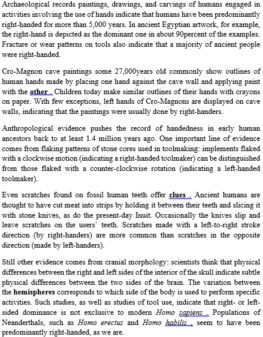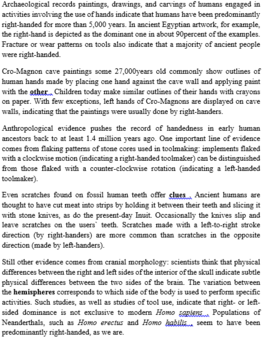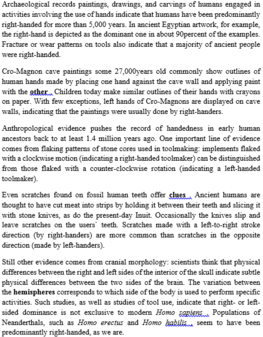Read the following passage and mark the letter A, B, C, or D on your answer sheet to indicate the correct answer to each of the questions from 22 to 26
A. Read the passage carefully, then choose the correct answer.
The ruined temples of Angkor are perhaps one of the mast impressive Seven Wonders of the World. Located in modern day Cambodia near Lake TonIe Sap, the largest freshwater lake in Asia, Angkor was the seat of power for the Khmer Empire from the ninth to the fifteenth century. The ruins of Angkor are documented as same .of the mast impressive ones in the world, rivaling the pyramids of Giza in Egypt. Why this mighty civilization died out is a question that archeologists are now only beginning to ponder. The answer, it turns out, may be linked with the availability of fresh water.
One possible explanation far the downfall of the Khmer Empire has to do with the inhabitants' irrigation system. The temple and palaces of Angkor were constructed around a series of artificial reservoirs and canals which were annually flooded to capacity by the Mekong River. Once filled, they were used to irrigate the surrounding rice patties and farmland during the course of the year. Farmers were completely dependent upon the water for their crucial rice crop. Without consistent irrigation, the farmers would have been unable to maintain functional crop production.
Scientists speculate that toward the end of the Khmer Empire the hydraulic systems of the reservoirs and canals broke down. The construction of hundreds of sandstone temples and palaces required an enormous amount of physical labor. In addition, as the capital of the Khmer Empire, Angkor contained upwards of one hundred thousand people who resided in and around Angkor. In order to feed so many people, the local farmers were driven to grow food quicker and more efficiently. After centuries of continual use, the irrigation system was pushed beyond its capacity. Soil erosion, nutrient depletion, and the loss of water led to decrease in the food supply. With less food available, the people of Angkor slowly began to migrate to other parts of Cambodia thus leaving the marvelous city of Angkor to be swallowed by the jungle. Therefore, it is speculated that the Khmer Empire may have fallen victim to its own decrepit infrastructure.
22. What is the passage mainly about?
A. Modern day agricultural procedures in Cambodia.
B. A possible explanation for the, decline of a civilization.
C. The essential role water plays in farming.
D. Religious temples of the ancient Khmer Empire.
23. The passage preceding the passage most likely discusses ______.
A. architecture of ancient Asian civilization
B. religious practices of the people of Angkor
C. the form of government practiced by the Khmer Empire
D. the other six wonders of the world
24. According to the passage, Lake Tonle Sap in Cambodia ______.
A. is an enormous fresh body of water in Asia
B. was unable to supply enough fish for the people of Angkor
C. became polluted due to a population explosion
D. is one of the Seven Wonders of the World
25. Why does the author mention the hydraulic systems of the reservoirs?
A. They supplied irrigation from the Indian Ocean.
B. They became non-functional due to overuse.
C. They were destroyed by nearby warrior tribes.
D. They helped transport the sandstones for constructing temples.
26. It can be inferred from the passage that the inhabitants of the Khmer Empire ______.
A. were intentionally starved by the farmers
B. lost their food source due to excess rainfall
C. supplemented their diets with 'meat hunted in the nearby jungles
D. depended upon rice as their main source of food
27. All the following are mentioned as events that can affect food supply EXCEPT.
A. erosion of soil B. contamination of soil
C. reduction of nutrients D. loss of water supply








Đáp án là B. a new research: một nghiên cứu mới
Nghĩa các từ còn lại: questionnaire: bản câu hỏi; experiment: thí nghiệm; work: tác phẩm